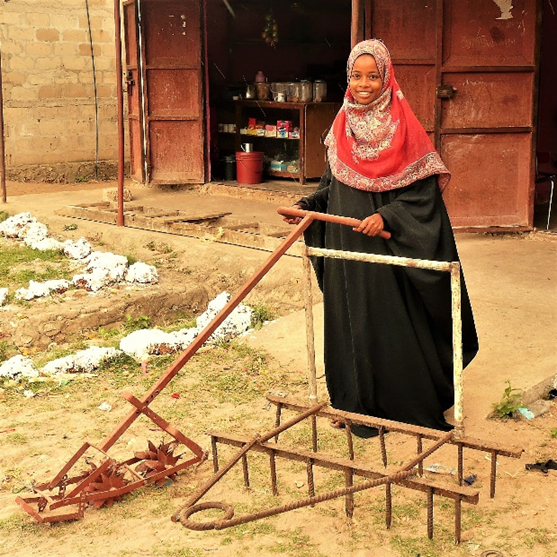Irrigation Technician by Day, Inventor by Night: Maryam’s Story

Irrigation Technician by Day, Inventor by Night: Maryam’s Story
By Ludovicka Shirima
March 7, 2017
 |
|
Maryam Mwalimu designs farming tools such as aquatic weeders and harrows for rice farming. |
Maryam Mwalimu is a 29-year-old product designer and entrepreneur from Zanzibar. She designs farming equipment’harrows, weeders, and harvesters. Maryam sees her business as a way to support farmers and advocate for better productivity with less effort.
Maryam is a very talented, focused, and determined young woman, all of which are required for any entrepreneur to be successful. But as a woman in a developing country and a Muslim-majority region, Maryam faces additional hurdles.
Some of them she has already cleared.
Unlike many women in Tanzania and in Zanzibar, Maryam has had access to education, receiving education and training in a traditionally ‘male’ types of technical work involving machinery. Her ‘day job’ is an agricultural irrigation technician with the Ministry of Agriculture, Natural Resources, Livestock, and Fisheries in Zanzibar. She provides technical and advisory services to rice farmers.
But outside of her day job, Maryam struggles to get her farming equipment business off the ground. As a woman in the business start-up realm, she often feels overlooked and in the dark. She doesn’t necessarily have access to the same information, resources, and networking opportunities. She may even be excluded from participating in learning events for entrepreneurs that would support her business growth.
She even struggles to find manufacturers who are willing to make the equipment she designs. She’s had to approach many technicians’all men’before finding one who agrees to do the work for her. The most common reason they give for refusing her: they don’t believe a woman could design tools that actually work.
Maryam also struggles to be taken seriously and supported by her colleagues. She recalls a time last year when she participated in the annual farm show to celebrate Nane Nane Day, which recognizes the contributions of farmers and agriculture to the Tanzanian economy. Nane nane means ‘eight eight,’ referring to August 8. Maryam was there to showcase her equipment designs. A high-level government official with the Ministry of Industries, she said, was very impressed with her innovations. But her own colleagues at the agriculture ministry mocked and dismissed her. Luckily, Maryam said, her immediate supervisor is always very encouraging and supports her efforts to help farmers and realize her business dreams.
Maryam’s farm equipment start-up is the type of small and medium enterprises that will be helped by the Enabling Growth through Investment and Enterprise Program. Working in Tanzania’s agricultural regions, through this program, IESC helps SMEs to grow by connecting them with vital business services (e.g. accounting, marketing, HR) and building the capacity of local government authorities to support and enable small businesses. The program is particularly focused on women- and youth-owned businesses and conducts extensive outreach to these business owners. IESC wants to be sure that young, talented, and ambitious entrepreneurs like Maryam are not left in the dark, that they have access to the information, resources, and networks they need to succeed.
If anyone has the passion to succeed in the face of challenges, it’s Maryam. In addition to her business, she’s hoping to win a scholarship to study engineering. She plans to use her degree to produce similar quality equipment on a larger scale: tractors, forklifts, or even cars. Her grand vision is to someday own a big company.
_______
Ludovicka Shirima is the gender and youth specialist with the Tanzania Enabling Growth through Investment and Enterprise Program. Implemented by IESC, the program is funded by USAID through the Volunteers for Economic Growth Alliance, or VEGA. The program is part of Feed the Future, America’s initiative to combat global hunger and poverty.


